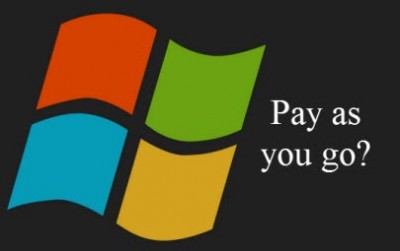 The latest scuttlebutt doing the rounds is that Microsoft may be planning to introduce a subscription based distribution model for its Windows operating system at some time down the track. Renowned Russian leaker WZor and well known Microsoft insider Mary Jo Foley have both recently hinted at the possibility.
The latest scuttlebutt doing the rounds is that Microsoft may be planning to introduce a subscription based distribution model for its Windows operating system at some time down the track. Renowned Russian leaker WZor and well known Microsoft insider Mary Jo Foley have both recently hinted at the possibility.
At first I dismissed the notion as being highly unlikely but then, after further consideration, I could envisage how this may well be part of Microsoft’s evolving strategy. Firstly; this is the way Microsoft chose to proceed with its latest Office Suite, changing the distribution model to one which is now primarily subscription based. It doesn’t necessarily follow that this will then be implemented for operating systems as well, but it’s certainly indicative of a particular mindset.
The second, even more compelling portent, is the drastic change Microsoft made to its update delivery schedule. As Mary Jo Foley stated in a recent article… “Instead of rolling out a new version of Windows once every 2.5 to three years, the [Microsoft] team is now on something closer to an annual rollout schedule.”
Of course, with all the public negativity toward Windows 8 desktop, this revamped release schedule has been fast-tracked even further as Microsoft continues to introduce adjustments in order to appease the detractors. Still, when all this finally settles down, an annual release cycle appears to be a pretty reasonable expectation.
So, if we accept that an annual update release cycle is the most likely scenario, then that certainly lends itself to a subscription based model, it’s just too neat to dismiss lightly. The combination of regular updates and subscriptions would also help ensure that everyone can keep up-to-date while doing away with the usual proliferation of versions created by perpetual licensing, with different customers stuck on different update levels and different support life-cycles. In fact, one could easily argue that the two go hand in hand.
 The rumor mill is suggesting a base-level Windows operating system for free with subscriptions required to access full capabilities. Again, Microsoft’s recent history with Office does appear to lend credence to the hypothesis. It has also been suggested that a monthly subscription may be on the cards as well as an annual subscription. Personally, I don’t see this as a viable option for most home users, given that annual subscriptions are generally less expensive than monthly, plus the fact that an operating system and the way in which we utilize it is generally more semi-permanent than transient.
The rumor mill is suggesting a base-level Windows operating system for free with subscriptions required to access full capabilities. Again, Microsoft’s recent history with Office does appear to lend credence to the hypothesis. It has also been suggested that a monthly subscription may be on the cards as well as an annual subscription. Personally, I don’t see this as a viable option for most home users, given that annual subscriptions are generally less expensive than monthly, plus the fact that an operating system and the way in which we utilize it is generally more semi-permanent than transient.
It’s certainly an intriguing prospect, but one which also raises plenty of questions, for example: what happens if a subscription is allowed to expire? I can’t see consumers being too happy if they inadvertently forget to renew for a particular period and are subsequently locked out. And what happens when one operating system becomes superseded by the next? It would seem a tad inequitable to expect users to keep paying fees for an out-of-date operating system, or to force them to update. As one commenter put it… “I don’t want to be railroaded into upgrading to Windows 8, if I’m currently happy with Windows 7. But then why should I keep paying a monthly fee for Windows 7, if development has moved onto Windows 8?”
It seems reasonable to assume that any such plan would involve ongoing subscriptions with annual upgrades included for free. I am also guessing that when older operating systems finally reach end of support, those users wishing to upgrade would have no other choice than to accept the subscription method. This would seem the logical approach, with every user eventually locked into a single (subscription based) model.
If this is truly on the agenda, Microsoft will need to tread warily and sort out these nuts and bolt issues prior to implementation. Any subscription based model is almost certain to live or die based on its initial terms and users’ acceptance of same… including the all important pricing factor.
Personally, I am not a fan of ongoing subscriptions at all, I’ve never come across anything that wasn’t more expensive in the long run as opposed to buying outright. And, try as might, I’ve struggled to come up with any benefits that a subscription based model might offer for your average home Windows users.
Of course, this is all hypothetical, but – what do you think? Could a subscription based operating system work? Would you go for monthly or yearly subs, and how much (or little) would you be prepared to pay?

Just quickly..I do agree with your words of wisdom,Jim.
One more thing about this that disturbs me is the almost compulsory requirement to be web-connected all the bloody time !!
I use Unity and various other 3D programs and find it almost impossible to use them on a workstation that is not www connected.
Some programs seem to want to connect with “base” to verify this and that before letting me use them at all !! This “confirmation” may happen at random during use !!
And this is after they’ve been fully paid for.
Very disturbing indeed.
What do you think?
Colin
I see no reason why basic Windows should not be completely free by now. Microsoft makes huge amounts of money out of business contracts involving installation and maintenance of Windows suites, and has saddled the world with Windows XP. Outrageously, it now wants to charge huge amounts to get out of the Windows XP trap. It wants from around £60 (Home Premium) to over £100 (Professional) for an operating system that it has built into a global monopoly, by essentially forcing PC manufacturers into the OEM Windows scheme. So, much of the developing world is left on Windows XP – how is an Indian, Chinese or African kid going to afford to upgrade? The answer is piracy I suppose, but that should not be being effectively encouraged. It would be nice if the Melinda and Bill Gates Foundation, built anyway on the proceeds of corporate greed, were to include the distribution of free versions of Windows. They could still charge for Windows Pro or Ultimate, only really needed by firms and corporates.
And after paying for Home Premium you get: no encrypting file system, no BitLocker or BitLocker to Go, no Group Policy Edit (useful even for the home user), no language packs…
And another thing… That cost is before you start to factor in the virtually compulsory Office suite. Why can’t Office 2003 be made available free now?
The services business model seems to work perfectly well for Ubuntu, and certainly Red Hat; it’s only Microsoft that continues to vastly overcharge the ordinary customer.
What I am suggesting would also have the effect of committing more people to Windows in the long term, which I suppose would be bad news for Linux. I think it’s realistic for future business, but when the current bottom line is the only arbiter of a company’s behaviour, probably unlikely to happen.
Colin B: You can turn off Unity’s irritating desire to contact Amazon by going to System Settings | Security & Privacy | Search and toggling the button to include online search results. There are one or two other check boxes around here that you can uncheck to avoid attempts to contact Canonical. That leaves Updates, which shouldn’t be a problem.
If Microsoft ever chooses to move to a subscription based model for Windows, that’s when I will consider dropping future versions of the operating system in favor of a Linux-based desktop. There’s no reason to stick with Windows if there are viable alternatives for most needs. Certainly an individual computer user can get by with a dedicated gaming console for that need and using a free operating system with applications for web browsing, YouTube viewing, email checking, word processing and other things.
I currently am using Windows 7 on my desktop system and Windows 8.1 on my laptop system (both of which are also configured to multi-boot with Ubuntu, Linux Mint and elementary OS). I considered moving my desktop to Windows 8, but when Microsoft discontinued their low-cost pricing of Windows 8 Pro after 3 months I decided that Windows 7 was working well enough for me. (Especially since I’m not willing to pay $200 for an OS that I had previously purchased for one-fifth that price…)
I don’t use Microsoft Office for my home computing (LibreOffice, Apache OpenOffice or Kingsoft Office Free are viable alternatives that do what I need…) so a $99 subscription may be cheap to some, but it’s not cheaper than free…
Hi Jim,
Cannot seem to find…System Settings | Security & Privacy …..
I’ve looked at the Security panel in Windows7 but the options I cannot find.
Are they in the Control Panel or System panel or should I be looking in Firefox?
Cheers,
Colin
Hi Colin B,
I’m sorry, I thought you were using Unity as in Ubuntu Unity, but I’ve just realised that you’re probably referring to the Unity3D application. If that’s the case, my apologies, I can’t help you.
Regards,
Martin Ward
I’m not sure what to think really but the current model seems to work so why change it. A monthly payment thing wouldn’t work – basically you’d be paying for bug fixes that’s down to them anyways. Fair enough a yearly fee, if it included a big update each year but I think people will prefer just upgrading when they want.
My hard drive is down and I’m using my lifeboat, Ubuntu 14.04. There just don’t seem to be any issues. I’m using Firefox 29, just like paying Windows users, Steam works great, although I’d like to see them jump in with both feet there, I pay NOTHING! Libre Office is good enough, Inkscape is what I use in Windows when it has a home, Thunderbird the same. I feel right at home and not caring what Microsoft tries. Let them try something and I’ll tell them if I think it’s worth paying for. Not much will be worth paying for, believe me! This Linux experience is fabulous. Microsoft’s move!